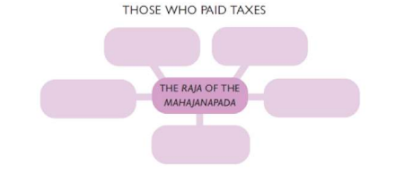NCERT Solutions for Chapter 6 Kingdoms, Kings and an Early Republic Class 6 History
In ancient India there were no leaders but were kings who are called Rajas. By making very large sacrifices, some men became Rajas. Horse sacrifice, or Ashvamedha, was one of these rituals. A horse was allowed to roam freely and was guarded by the raja's men. They had to fight if the horse wandered into the kingdoms of other rajas. In ancient India, the Janapadas were the highest political unit. After the demise of the Indus Valley Civilization, the Mahajapadas saw the emergence of India's first large cities. Mahajanapadas are sixteen in number. Taxes were regularly collected from grihapatis who farmed the land by the kings.

Chapter Name | Kingdoms, Kings and an Early Republic NCERT Solutions |
Class | CBSE Class 6 |
Textbook Name | History |
Related Readings |
|
LET'S RECALL
Question 1: State whether true or false:
(a) Rajas who let the ashvamedha horse pass through their lands were invited to the sacrifice.
(b) The charioteer sprinkled sacred water on the king.
(c) Archaeologists have found palaces in the settlements of the janapadas.
(d) Pots to store grain were made out of Painted Grey Ware.
(e) Many cities in mahajanapadas were fortified.
Answer
(a) True
Rajas who let the ashvamedha horse pass through their lands meant that they accepted that the raja who wanted to perform the sacrifice was stronger than them. These rajas were then invited to the sacrifice, which was performed by specially trained priests.
(b) False
His charioteer, who was the Raja's companion in the battle field and witness to his exploits, chanted tales of his glory.
(c) False
Archaeologists have found that people lived in huts & kept cattle as well as other animals in the settlements of the janapadas.
(d) True
Some of the earthen pots used to store grain were grey in colour and known as Painted Grey Ware.
(e) False
Only the capital city in mahajanapadas were fortified.
Question 2: Fill in the chart given below with the terms: hunter-gatherers, farmers, traders, crafts persons, herders.

Farmers- one sixth of the produce
Crafts persons- in form of labour
Herder- in form of animal & animal produce
Traders- on good brought & sold through trade
Hunter gatherers- had to provide forest produce as tax to the raja
Question 3: Who were the groups who could not participate in the assemblies of the ganas?
Answer
The following groups couldn't participate in the assemblies of the ganas:
1. WomenQuestion 4: Why did the rajas of mahajanapadas build forts?
Answer
The rajas of mahajanapadas build forts around their capital city to protect it against attacks from other kings, also it meant living in the fortified city could be better governed. It is also probable that some kings wanted to show how rich and powerful they were by building large, tall and impressive walls around their capital.
Question 5: In what ways are present-day elections different from the ways in which rulers were chosen in janapadas?
Answer
In janapadas, men became 'rajas' by performing the Ashvamedha sacrifice. The rajas who let the ashvamedha horse pass through their lands meant that they accepted that the raja who wanted to perform the sacrifice was stronger than them.
In the modern times, we have a democratic system for electing our leaders. Each citizen who is 18 yrs old (or older) has the right to cast his/her vote. The contesting candidate with majority of votes wins the election, thus becoming the public leader.
Question 6: Find the state in which you live in the political map on page 136. Were there any janapadas in your state? If yes, name them. If not, name the janapadas that would have been the closest to your state, and mention whether they were to the east, west, north or south.
Answer
I live in New Delhi and the city had the Purana Qila janapada, close to the Yamuna river.
Question 7: Find out whether any of the groups mentioned in answer 2 pay taxes today.
Answer
No, groups mentioned in the Answer don't pay taxes in today's time because their they do not have a high source of income from their work.
Question 8: Find out whether the groups mentioned in answer 3 have voting rights at present.
Answer
Yes, the groups mentioned in Answer 3 now have voting rights since we live in a democratic country.
